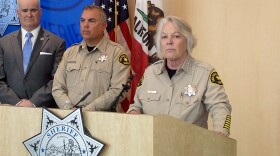Little Matias is no ordinary baby. He was born to Cuban migrants in Tijuana on June 11 – just one week before his family was scheduled to enter the U.S. to pursue a political asylum claim.
The unusual circumstances of Matias’ birth can be explained by the actions of two governments. The first was the surveillance of his father, Jiovany, by the communist dictatorship in Cuba. Last October Jiovany, a Pentecostal preacher who often criticized the regime, decided his family needed to flee the country or risk being jailed.
“There was always someone from the government listening and spying during my sermons,” Jiovany said in Spanish during an interview this week. KPBS is withholding the family’s last name to protect their identity.
The second action was the Biden administration’s decision in January 2023 to make a mobile app called CBP One the main way to seek asylum in the U.S. Jiovany, his wife Magalys and their two teenage children used CBP One for their asylum application.
Magalys had just found out she was pregnant when she filled out the application from Mexico City. But she was confident they’d get their asylum appointment long before her due date. It turned out she was mistaken.
Experts said this family’s case illustrates the danger and uncertainty asylum seekers face in Mexico while waiting for CBP One appointments.
In the year and a half since the Biden administration launched CBP One, it has gradually blocked other methods of accessing the U.S. asylum system, essentially funneling more and more migrants to the app.
Between January 2023 and April 2024, more than 500,000 people have entered the United States through CBP One appointments, according to data from the federal government.
But since the beginning the app has been glitchy and inaccessible to migrants who don’t have smartphones, those with certain disabilities and anyone who doesn’t speak English, Spanish or Haitian Creole. And it’s not coming close to meeting the overall need.

“We are very familiar with all of the problems with CBP One, including but not limited to the fact that there are very limited appointments that are far lower than the number of people who need them,” said Melissa Crow, director of litigation for the Center for Gender and Refugee Studies, one of several organizations currently suing the Biden administration over its asylum policies.
There are 1,450 appointments available every day. The app works as a lottery and gives some priority to users who have been waiting the longest, according to U.S. Customs and Border Protection.
The average wait time to schedule a CBP One appointment in Tijuana is seven months, according to local officials. The prolonged wait times put already-vulnerable migrants living in dangerous Mexican border cities in precarious situations, Crow said.
Jiovany spoke of the anxiety he and his family felt while waiting in Mexico for their appointment.
“It was like being in jail, waiting for someone to come and bail you out,” he said. “The thought of being so close to our goal only to have it taken away from us, I don’t even know how to explain it.”
The family couldn’t work, and therefore had very little money. They faced an unstable living situation, bouncing around various migrant shelters. And they lived in constant fear that Mexican immigration officials would deport them back to Cuba, he said.
Magalys told KPBS that her family was robbed twice while traveling from Mexico City to Tijuana. Once by local gang members dressed in uniforms from Mexico’s National Guard, and a second time by actual members of the National Guard, she said.
“We have been through a lot,” she said. “A lot of difficult experiences.”
Magaly’s due date was June 18 – which was also the day of their CBP One appointment. The family tried to contact Customs and Border Protection through an email they found on the CBP One app. No response.
Magalys prayed for baby Matias to wait. But he came early – born on June 11.
CBP One does not allow users to update their registration. The family feared that they wouldn’t be allowed to enter the country with their newborn child.
The thought of starting again with a brand-new registration and waiting another six months brought tears to Magalys’ eyes.
Volunteers at the Tijuana migrant center the family lived in suggested they reach out to Enrique Lucero, head of Tijuana’s Migrant Affairs Department.
“This is becoming more common; babies being born before their appointments,” Lucero said.
Lucero knows of at least four other families that this has happened to in Tijuana. Including one Haitian family that was not allowed to enter the United States because their newborn was not in the original application.
He helped the Cuban family to get Matias a birth certificate and Mexican citizenship papers. He gave those documents to Mexican immigration officials who then passed them along to their counterparts at CBP.
The intervention worked.
On Tuesday, the family crossed into the U.S. together.
“I look forward to being free,” Jiovany said. “To not have to live under a dictatorship.”
By Wednesday, the family already made travel arrangements to connect with family in Utah while they pursue their political asylum claim.





